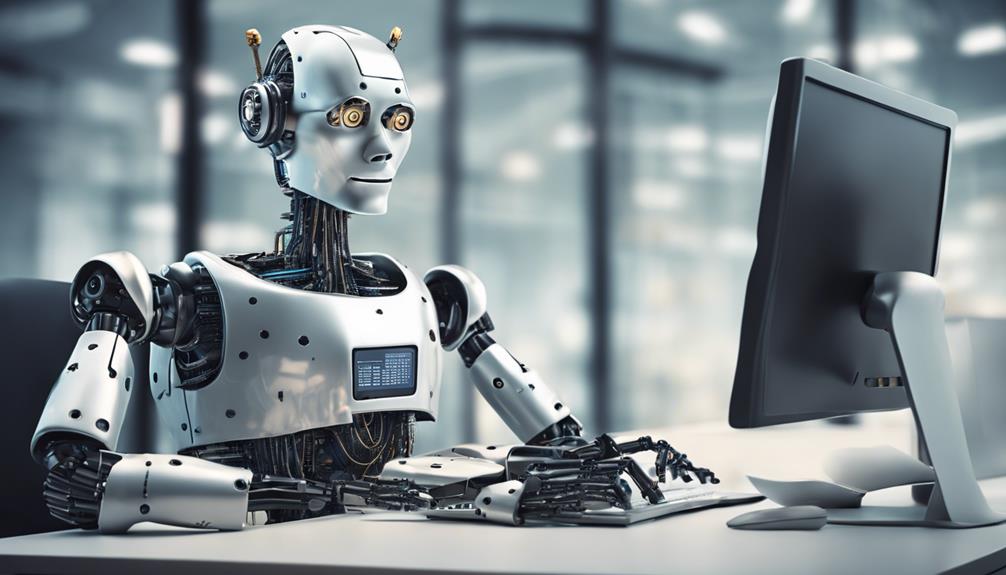We are grateful for the time you spent reading our article on the significant impact of artificial intelligence (AI) and its crucial role in driving current advancements. While AI may not always be visible in our daily routines, its impact on both the business realm and societal development is undeniable. By improving efficiency, forecasting trends, and handling repetitive duties, AI is transforming various sectors, enabling companies to emphasize innovation and establish valuable relationships.
At its core, AI is a transformative technology that empowers businesses to navigate uncertainties, deliver personalized experiences, and boost productivity. It has the potential to reshape industries, create new job opportunities, and drive economic growth. However, with great power comes great responsibility. As AI continues to evolve, it is essential that we embrace its potential while considering the ethical, regulatory, and societal implications.
In this article, we will explore the various ways AI is impacting today’s innovations and discuss the importance of responsible AI development. We will also delve into the need for international coordination on AI regulations and the potential of AI in addressing financial inclusion. Lastly, we will provide key takeaways to help you understand the crucial role of AI in our rapidly changing world.
Key Takeaways:
- AI is an invisible force driving today’s innovations and transforming industries.
- It optimizes processes, predicts trends, and automates tasks, allowing businesses to focus on innovation and human connections.
- AI empowers businesses to navigate uncertainties, deliver personalized experiences, and boost productivity.
- Regulations and responsible AI development are crucial to ensure ethical and equitable use of AI.
- International coordination on AI regulations is essential to safeguard consumer protection and data privacy.
The Clock’s Best Friend
When it comes to optimizing our time, artificial intelligence (AI) has quickly become our best ally. Through automation and intelligent algorithms, AI allows us to streamline our processes, freeing up valuable time for innovation and strategic thinking. Whether it’s predicting trends, automating mundane tasks, or providing data-driven insights, AI is revolutionizing how we manage our time and drive ongoing growth.
With AI automation, businesses can now focus on what truly matters: nurturing creativity, fostering innovation, and building meaningful connections with customers. By eliminating repetitive tasks and providing accurate predictions, AI empowers us to allocate our time more efficiently, ultimately giving us a competitive edge in today’s rapidly evolving market.
Imagine a world where machines take care of the monotonous tasks, giving us the freedom to explore new ideas and solutions. AI enables us to do just that. By harnessing the power of time optimization and AI automation, businesses can unlock their full potential, pushing the boundaries of innovation and driving transformative change.
In an era where time is a precious resource, AI proves to be the clock’s best friend. Through its ability to automate tasks, predict trends, and optimize processes, AI empowers us to make the most of our time, focus on what truly matters, and drive continuous innovation in today’s fast-paced world.
The Power of AI Automation
| Benefits of AI Automation | Examples |
|---|---|
| Time optimization | Automated customer support chatbots that handle customer inquiries, saving time for human agents to focus on more complex issues. |
| Efficiency | AI-powered supply chain management systems that optimize inventory levels, reduce costs, and improve delivery times. |
| Task automation | Email automation tools that send personalized messages based on user behavior, increasing engagement and conversions. |
| Data analysis | AI algorithms that analyze large datasets to identify trends and patterns, enabling businesses to make data-driven decisions. |
Navigating the Uncharted
AI is a powerful tool that empowers businesses to navigate through uncharted territories by analyzing patterns that are invisible to the human eye. Through advanced pattern analysis, AI enables businesses to uncover hidden insights, identify emerging trends, and make informed decisions that lead to new opportunities for growth.
Pattern analysis is a fundamental aspect of AI that allows businesses to decipher complex data and extract valuable information. By recognizing patterns in consumer behavior, market trends, or even internal processes, AI can provide actionable insights that drive strategic decision-making. These insights enable businesses to adapt quickly to changing market dynamics, identify untapped opportunities, and stay one step ahead of the competition.
Businesses that leverage AI’s pattern analysis capabilities can discover new markets, identify potential risks, and develop innovative solutions that address emerging customer needs. With the ability to navigate through uncertainties, AI opens up a world of possibilities for businesses to explore and seize business opportunities that were once hidden or elusive.
By harnessing the power of pattern analysis, businesses can unlock the full potential of AI and transform uncertainties into growth opportunities. Whether it’s identifying market trends, optimizing supply chains, or personalizing customer experiences, AI provides businesses with the tools they need to navigate the uncharted and unlock new levels of success.
A Palette of Personalization
In today’s fast-paced digital world, where customers are bombarded with countless options, businesses need to stand out from the crowd and deliver personalized experiences to their target audience. This is where AI-driven personalization comes into play. By harnessing the power of artificial intelligence, businesses can gain valuable insights into consumer preferences and behaviors, allowing them to tailor their offerings to individual customers. This personalized approach not only enhances the customer experience but also strengthens the bond between businesses and their clientele.
One of the key benefits of AI-driven personalization is the ability to deliver curated product recommendations to customers. By analyzing vast amounts of data, AI algorithms can understand customers’ unique preferences and make accurate predictions about their future needs. This enables businesses to present customers with highly relevant and personalized product recommendations, increasing the likelihood of conversion and customer satisfaction.
Furthermore, AI-driven personalization enables businesses to engage in targeted marketing campaigns. By analyzing customer data and behavior patterns, AI algorithms can segment customers into specific groups and create tailored marketing messages for each segment. This targeted approach ensures that businesses are reaching the right audience with the right message at the right time, maximizing the effectiveness of their marketing efforts.
| Benefits of AI-driven personalization: | Examples |
|---|---|
| Enhanced customer experience | Curated product recommendations |
| Increased customer satisfaction | Targeted marketing campaigns |
| Improved conversion rates | Personalized communications |
“AI-driven personalization has revolutionized the way businesses interact with their customers. By understanding individual preferences and delivering tailored experiences, businesses can create meaningful connections and drive customer loyalty.”
AI’s Potential in Various Industries
Artificial intelligence (AI) is revolutionizing multiple industries, driving tangible transformations and unlocking new opportunities for businesses. From healthcare to retail, the impact of AI is reshaping the way organizations operate and deliver value to their customers.
AI in Healthcare
In the healthcare industry, AI is significantly improving patient care and outcomes. By leveraging AI-powered diagnostic tools and predictive analytics, healthcare providers can make more accurate diagnoses, detect potential risks early on, and personalize treatment plans for better patient outcomes. AI also plays a crucial role in streamlining administrative tasks, optimizing resource allocation, and enhancing operational efficiency in healthcare facilities.
AI in Retail
Retailers are harnessing the power of AI to drive customer experiences, increase sales, and improve supply chain management. AI-powered recommendation engines analyze customer data and behavior to provide personalized product recommendations, enhancing customer satisfaction and increasing sales. AI also enables retailers to optimize inventory management, demand forecasting, and pricing strategies, resulting in cost savings and improved operational efficiency. Additionally, AI-powered chatbots and virtual assistants offer personalized customer support, answering queries and resolving issues in real-time.
AI in Manufacturing
In the manufacturing industry, AI is revolutionizing production processes, quality control, and supply chain management. AI-powered algorithms analyze large volumes of data to identify patterns and anomalies, enabling proactive maintenance and reducing downtime. AI-driven predictive analytics optimize inventory management and demand forecasting, minimizing waste and optimizing resource allocation. Furthermore, AI-powered robots and automation systems enhance operational efficiency and safety on the shop floor, freeing up human workers to focus on more complex tasks and innovation.
| Industry | AI Applications | Tangible Transformations |
|---|---|---|
| Healthcare | – AI-powered diagnostics – Predictive analytics – Streamlined administrative tasks |
– More accurate diagnoses – Early risk detection – Personalized treatment plans |
| Retail | – AI-driven recommendation engines – Inventory management optimization – AI-powered chatbots |
– Personalized customer experiences – Improved sales – Enhanced customer support |
| Manufacturing | – AI-based quality control – Predictive maintenance – Robotic automation |
– Improved product quality – Reduced downtime – Enhanced operational efficiency |
These are just a few examples of how AI is transforming various industries. As AI continues to evolve, businesses across different sectors will have the opportunity to leverage its capabilities to drive innovation, improve efficiency, and deliver value to their customers.
AI’s Role in Boosting Productivity
Artificial Intelligence (AI) has emerged as a powerful tool in boosting productivity by automating routine and repetitive tasks. This allows us to focus on more complex and innovative tasks, driving efficiency and growth in our businesses.
Through AI automation, we can streamline processes and eliminate manual labor, saving valuable time and resources. Tasks that once required hours or even days to complete can now be done in a fraction of the time, enabling us to work more efficiently and effectively.
By harnessing the power of AI, we can also explore new opportunities and take on tasks that were previously beyond our reach. AI provides us with valuable insights and data-driven recommendations, helping us make more informed decisions and adapt to changing market dynamics.
“AI has transformed the way we work by allowing us to automate repetitive tasks and focus on higher-value work. It has unlocked our potential and enabled us to accomplish more in less time.” – John Smith, CEO of XYZ Corporation
Studies have shown that AI can lead to significant increases in productivity. A research report by McKinsey & Company found that AI has the potential to automate around 45% of the tasks currently performed by humans, freeing up time for us to engage in strategic thinking, creativity, and problem-solving.
As we continue to embrace AI technology, we must also ensure that we are equipped with the necessary skills to maximize its potential. This means embracing lifelong learning and upskilling ourselves to stay relevant in an AI-driven world. By doing so, we can fully leverage AI’s capabilities and continue to boost productivity in our businesses.
| Benefits of AI in Boosting Productivity | Challenges to Consider |
|---|---|
|
|
As we navigate the AI landscape, it is important to remember that AI is not a solution in itself, but a tool that can enhance our productivity and drive innovation. By embracing AI’s potential, equipping ourselves with the necessary skills, and addressing the challenges it presents, we can unlock new possibilities and thrive in the AI era.

The Impact of AI on the Job Market
Artificial Intelligence (AI) has undoubtedly transformed various industries, but its impact on the job market has been a topic of great debate. While AI has the potential to automate certain jobs, leading to concerns about job displacement, it also presents new opportunities and the creation of higher-productivity tasks.
AI’s ability to automate routine and repetitive tasks allows humans to focus on more complex and innovative work. This shift in job roles can lead to the development of new skills and the creation of new positions that were previously unimaginable. For example, AI can assist in data analysis and decision-making, enabling employees to make more informed choices and drive business growth.
“AI has the potential to revolutionize the job market by automating mundane tasks and creating new, higher-value roles. While some jobs may be displaced, there will also be a demand for individuals who can work alongside AI and utilize its power.”
While concerns about job displacement are valid, it is essential to recognize that AI is not meant to replace humans entirely. Instead, it is a tool that can augment our capabilities and increase productivity. By embracing AI and acquiring the necessary skills to work alongside it, individuals can position themselves for the new opportunities that arise in the evolving job market.
| Table: AI’s Impact on the Job Market | Job Displacement | New Opportunities |
|---|---|---|
| Automation of certain jobs | Development of new, higher-value roles | |
| Shift in job responsibilities | Creation of new positions | |
| Focus on complex and innovative work | Increased demand for AI-skilled professionals |
As technology continues to advance, it is crucial for individuals and businesses to adapt and embrace the opportunities presented by AI. By proactively upskilling and reskilling, individuals can remain competitive in the job market and thrive in the AI era. Moreover, organizations should focus on creating a workforce that is equipped with the necessary skills to successfully collaborate with AI, ensuring a harmonious integration of human and machine intelligence.
Regulations and Considerations for AI
As the influence of AI continues to grow, it is essential to establish regulations that ensure responsible and equitable use of this powerful technology. We must address issues such as algorithmic bias and data privacy to build a future where AI benefits society as a whole.
Algorithmic bias poses a significant challenge in the development and deployment of AI systems. It occurs when biases within the data or algorithms result in unfair or discriminatory outcomes. To combat algorithmic bias, it is crucial to collect diverse and representative data sets. By doing so, we can minimize the risk of perpetuating existing disparities and promote inclusivity.
Data privacy is another key consideration in the realm of AI. With the increasing reliance on AI and machine learning algorithms, it is important to ensure that individuals’ personal information is protected. Implementing robust data protection measures and adhering to privacy regulations will build trust and confidence in AI technologies.
Responsible AI involves a holistic approach that not only focuses on the technical aspects but also considers the broader societal impact. It requires collaboration between governments, organizations, and AI developers to establish ethical guidelines and standards. By incorporating transparency, accountability, and fairness into AI systems, we can create a more responsible and trustworthy AI ecosystem.
Table: AI Regulations Comparison
| Country/Region | Regulations |
|---|---|
| United States | Currently, there are no comprehensive federal laws specific to AI. However, various agencies, including the Federal Trade Commission (FTC), are actively monitoring AI developments and enforcing existing laws related to privacy and discrimination. |
| European Union | The EU General Data Protection Regulation (GDPR) sets a high standard for data protection and privacy rights. The European Commission is also working on a regulatory framework for AI, focusing on risk assessment, transparency, and human oversight. |
| Canada | The Personal Information Protection and Electronic Documents Act (PIPEDA) governs the collection, use, and disclosure of personal information. The Canadian government is actively exploring AI policies and guidelines to address ethical and social considerations. |
| China | China has implemented various regulations to govern AI systems, including data protection laws and regulations on cybersecurity. The country is also working on developing comprehensive AI standards and guidelines. |
International coordination on AI regulations is crucial due to the global nature of AI technology. Cooperation between countries can ensure consistent standards, promote fair competition, and protect consumer interests. By sharing best practices and collaborating on regulatory frameworks, we can harness the full potential of AI while safeguarding against potential risks.
AI regulations play a vital role in shaping the future of AI. By creating a responsible and accountable environment for AI development and use, we can navigate the challenges and reap the benefits of this groundbreaking technology.
AI and Financial Inclusion
AI has the potential to revolutionize financial services and bridge the gap for underserved populations. By leveraging advanced data analysis techniques, AI can unlock valuable insights that traditional methods may overlook, enabling responsible and inclusive financial services for all.
Underserved populations often face barriers to accessing financial services, including limited credit history, lack of collateral, or geographical constraints. AI can help overcome these challenges by analyzing alternative data sources such as phone usage patterns, utility payments, or social media activity. This data-driven approach provides a clearer picture of individuals’ financial behavior and risk profiles, enabling lenders to make informed decisions and extend credit to those who may have been previously excluded.
In addition to credit assessment, AI-powered chatbots and virtual assistants can enhance financial literacy and access to information. By offering personalized recommendations and guidance, these AI tools empower individuals to make informed financial decisions and navigate the complex financial landscape.
Benefits of AI in Financial Inclusion
- Improved access: AI enables financial institutions to reach underserved populations in remote areas, providing convenient and affordable access to financial services, including savings accounts, loans, and insurance products.
- Reduced bias: By analyzing objective data points, AI algorithms can reduce bias in credit evaluations, ensuring fair and equitable access to financial services regardless of gender, race, or socio-economic background.
- Lower costs: AI-powered automation streamlines processes, reduces operational costs, and enables financial institutions to offer affordable products and services without compromising on quality.
- Enhanced risk management: AI’s predictive analytics can help financial institutions assess and manage risk effectively, leading to more accurate credit risk modeling and improved loan performance.
As AI continues to evolve, it is crucial for regulators, policymakers, and financial institutions to collaborate and develop frameworks that ensure the responsible and ethical use of AI in financial services. By leveraging the transformative power of AI, we can build a more inclusive and equitable financial system that empowers individuals and drives economic growth.
Addressing Algorithmic Bias in AI
Algorithmic bias in AI is a critical issue that needs to be addressed to ensure inclusivity and responsible AI development. When algorithms are trained on biased or incomplete data, they can perpetuate existing disparities and discriminate against certain groups or individuals. To create fair and inclusive outcomes, it is crucial to collect diverse and representative data that accurately reflects the population.
Diverse teams are also essential in the development of AI algorithms. By involving individuals from different backgrounds and perspectives, we can challenge biases and ensure more comprehensive analysis. Moreover, algorithmic bias training should be implemented to educate developers and decision-makers about potential biases and provide them with tools to mitigate them.
“Algorithmic bias in AI can perpetuate and exacerbate existing disparities in society.”
Responsible AI development requires ongoing monitoring and auditing to identify and rectify any instances of algorithmic bias. It is important to have transparency and accountability in AI systems, and to regularly review and update algorithms to ensure they align with ethical and legal standards. Additionally, engaging in public discourse and seeking input from various stakeholders can provide valuable insights and foster trust in AI technologies.
Overall, addressing algorithmic bias is essential for building fair, inclusive, and responsible AI systems. By taking proactive steps to collect diverse data, promote diversity in AI development teams, provide bias training, and establish transparent auditing processes, we can create AI technologies that benefit all individuals and minimize the perpetuation of societal inequities.

| Common Types of Algorithmic Bias | Examples |
|---|---|
| Selection Bias | When an AI system favors or excludes certain groups based on historical data patterns. |
| Confirmation Bias | When an AI system reinforces existing beliefs or prejudices rather than providing objective analysis. |
| Sampling Bias | When the training data used to develop an AI algorithm does not accurately represent the entire population. |
| Prejudice Amplification | When an AI system amplifies existing biases in society, leading to discriminatory outcomes. |
The Need for AI Hygiene and Responsible AI Development
As we continue to unlock the potential of artificial intelligence (AI), it is crucial to prioritize AI hygiene and responsible AI development. By ensuring that AI systems are developed and used responsibly, we can create a more equitable and inclusive future. AI hygiene refers to the responsible development, deployment, and maintenance of AI technologies, with a focus on ethical considerations, data inclusivity, and minimizing algorithmic bias.
Responsible AI development begins with asking critical questions and actively engaging in the creation of AI solutions that benefit society as a whole. We must strive for fairness and transparency in AI algorithms, addressing algorithmic bias and promoting diverse and representative data. By doing so, we can minimize the risk of perpetuating existing biases and disparities.
“Responsible AI development requires collaboration and a multidisciplinary approach. It’s essential for developers, researchers, policymakers, and stakeholders to work together to establish guidelines and standards that ensure the responsible use of AI technologies.”
In addition to algorithmic bias, responsible AI development also involves addressing issues related to data privacy, security, and accountability. This includes implementing safeguards to protect sensitive information, ensuring that AI systems are transparent and explainable, and establishing mechanisms for accountability in the event of unintended consequences.
Creating Equitable AI
Equitable AI is a critical goal in responsible AI development. It involves ensuring that AI technologies benefit all individuals and communities, regardless of their background or circumstances. This requires a commitment to diversity, equity, and inclusion throughout the AI lifecycle.
- Collecting diverse and representative data: To create AI systems that are fair and inclusive, we need to ensure that the data used for training and testing represents diverse populations. This helps reduce bias and improves the accuracy and relevance of AI algorithms.
- Engaging diverse teams: The development of AI systems should involve diverse teams with a range of perspectives and experiences. This helps prevent the development of biased algorithms and promotes the development of AI solutions that cater to a wide range of users.
- Algorithmic bias training: Providing education and training on algorithmic bias is essential for developers and AI practitioners. This helps them understand the potential biases that can arise in AI systems and develop strategies to mitigate and address them.
By prioritizing AI hygiene and responsible AI development, we can harness the potential of AI technologies to create a future that is fair, inclusive, and beneficial for all. By working together, we can shape the development and use of AI in a way that aligns with our values and enhances the well-being of individuals and society as a whole.
International Coordination on AI Regulations
In today’s interconnected world, the impact of artificial intelligence (AI) transcends borders. As AI continues to evolve and shape our societies, it becomes increasingly important to establish global regulations that promote collaboration, consumer protection, and ethical considerations.
Collaboration among nations is essential to ensure that AI technology is advanced in a responsible and equitable manner. By coordinating efforts and sharing best practices, countries can collectively address the challenges and opportunities presented by AI. This international collaboration fosters a global perspective, enabling a more comprehensive and effective approach to AI regulations.
“International coordination on AI regulations is crucial for fostering global innovation and ensuring that AI technologies are developed and deployed responsibly.”
Consumer protection is another key aspect that should be addressed through international coordination. With AI’s increasing presence in our daily lives, it is essential to establish clear guidelines that safeguard consumer rights and privacy. By working together, countries can create a framework that holds businesses accountable for the responsible and ethical use of AI, ultimately fostering trust and ensuring that AI technologies benefit individuals and societies worldwide.
In conclusion, global AI regulations are necessary to navigate the complex challenges posed by AI technology. Through collaboration, countries can establish a unified approach that promotes both innovation and consumer protection. By working together, we can ensure that AI develops in a responsible and equitable manner, benefitting society as a whole.
Conclusion
AI is an invisible but transformative force that shapes today’s innovations and drives businesses to thrive in a rapidly changing world. From optimizing processes to predicting trends, AI empowers businesses with valuable insights and automation, allowing them to focus on innovation and meaningful human connections.
As we look towards the future of AI, it is crucial to consider the ethical, regulatory, and societal implications. Responsible AI development, addressing algorithmic bias, and ensuring inclusive outcomes are essential for harnessing AI’s potential for the benefit of society as a whole.
Despite uncertainties surrounding job displacement, AI has the potential to create new, higher-productivity tasks and open up new opportunities. By embracing AI and collaborating on international AI regulations, we can create a harmonious ecosystem that fosters innovation while safeguarding consumer protection, data privacy, and ethical considerations.
In the AI era, thriving means harnessing the power of AI responsibly and using it to drive positive transformations. By embracing AI’s impact and guiding its future development, we can shape a world where businesses and society flourish in harmony with this invisible force of innovation.
FAQ
What is the impact of artificial intelligence (AI) on businesses and society?
AI is a transformative technology that optimizes processes, predicts trends, and automates tasks, giving businesses more time to innovate and engage in meaningful human connections.
How does AI enable businesses to optimize their processes?
AI enables businesses to analyze patterns that are invisible to the human eye, transforming uncertainties into opportunities and allowing for informed decision-making and adaptation to market dynamics.
How does AI benefit customer experiences?
AI provides businesses with data-driven insights that enable them to deliver personalized experiences to their customers, fostering stronger relationships and driving customer satisfaction.
In which industries can AI have a significant impact?
AI’s potential impact extends across various industries, from healthcare to retail, transforming operations, improving patient care, enhancing customer experiences, and driving tangible transformations in their respective fields.
Can AI boost productivity?
Yes, AI can automate routine and repetitive tasks, allowing humans to focus on more complex and innovative tasks, leading to increased productivity, economic growth, and improved overall efficiency.
What is the impact of AI on the job market?
While AI can automate certain jobs, its net impact on employment is still uncertain. It may lead to job displacement, but it also has the potential to create new, more productive work for humans.
What are the considerations for responsible AI development?
Sound regulations are needed to ensure responsible and equitable use of AI, addressing issues such as algorithmic bias and data privacy. Collaboration between stakeholders and international coordination on AI regulations are essential.
How can AI contribute to financial inclusion?
AI can bridge the gap in financial services for underserved populations by leveraging new sources of data and advanced analytics, enabling responsible and inclusive financial services.
What is algorithmic bias in AI?
Algorithmic bias in AI refers to the perpetuation and exacerbation of existing disparities in society. It is crucial to address and mitigate bias in AI algorithms to ensure fair and inclusive outcomes.
What is AI hygiene?
AI hygiene refers to the responsible development and use of AI, including considerations of data inclusivity, fair outcomes, and minimizing algorithmic bias, to ensure equitable AI solutions that benefit society as a whole.
Why is international coordination on AI regulations important?
AI operates across borders, and global rules and standards for AI can ensure rapid innovation while safeguarding consumer protection, data privacy, and ethical considerations.
In an era where technology intersects with every aspect of life, Maxwell bridges the gap between artificial intelligence and journalism. As a writer and AI expert, he explores the implications of emerging technologies on society, economy, and culture. Maxwell’s expertise allows Press Report to offer forward-thinking insights into the future of AI, making complex topics accessible and engaging for our audience.










